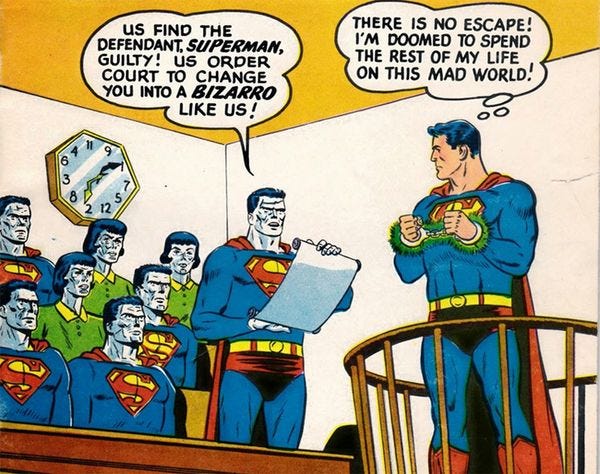Utah Puts Science Standards On Hold, Demands More Local Control Of Reality
Congratulations go out to the great state of Utah, which is in the process of revising its state science education standards for the first time in nearly 20 years. The new proposed standards will be phased in, starting with grades six, seven, and eight, and will emphasize more direct, hands-on experimentation along with classroom lectures and labs, to encourage scientific thinking. But this being a Wonkette story that doesn't have "Nice Time" in the headline, you already know, Dear Reader, what's coming next: there's just one or two teensy-tiny problems that some people are having with bringing Utah's science education into the 21st century, and they have to do with the fact that the proposed science standards include too much darned science for some people's tastes. Because of complaints from parents, the Utah Board of Education has put on hold plans to move the new standards to their next stage, a public-comment period.
Like recent kerfuffles over science education standards in Wyoming and West Virginia, the Utah standards are coming under attack from conservatives who insist the multi-state model they're based on, the Next Generation Science Standards, are tainted by liberal bias when it comes to climate science, which would be bad for those states' coal industries. And didn't we just write this story once already today?
[contextly_sidebar id="tJKnzvHRaTU9knJvL52c3GnX5DYYvO2U"]
(Also, a nice-times update on one of those states: West Virginia's Board of Education eventually voted to keep the Next Generation standards intact, without the climate-denying idiocy that one board member had added.)
Now of course in Utah, it's not merely the climate stuff that's "controversial," but also the teaching of evolution, which was already in the state standards, but which some parents are telling the state school board's Standards and Assessment Committee is pretty radical stuff. Also, at least one angry parent wants to know why Utah even needs a bunch of science standards that were developed by a national committee, which clearly didn't take Utah's unique science needs into account:
"I am not in favor of the draft standards," said Allisa Ellis, a Utah County parent who served on a state review committee for the standards. "I think we should send them back and start over."
Ellis said Utah's new standards were "copied and pasted" from the Next Generation Science Standards, which, like the Common Core, were written by a consortium of national experts and are now being considered by several states.
Also critical of the Next Generation model was parent Vincent Newmeyer, another member of the standards review committee:
"There was only minor, minor fluff put on to make a Utah-type standard," Newmeyer said.
Newmeyer said greater involvement from Utah's parents was needed in the drafting process. He said most of the participants on the 15-member review committee, which by statute includes appointees selected by the Utah Senate, Utah House and state school board, were culled from schools and universities.
"There were only a few people who carried the parent frame of mind," he said. "All the others had been schooled in the framework of educational thought."
Neither Ellis nor Newmeyer articulated what exactly makes science work differently in Utah than other places, but apparently, physics, chemistry, biology, geology, and other scientific topics need to subject to local input. And god forbid educators should be the primary designers of educational policy. We are especially in love with the following two paragraphs from the Salt Lake Tribune:
Newmeyer believes Utah's proposed guidelines took positions on controversial subjects, with students expected to accept as fact concepts that remain under debate -- at least politically.
"That is true with global warming, that is true with Darwinian evolution and a number of other things," he said. "It's not a science class in these areas. It's an indoctrination class."
Translation: If a parent thinks something isn't science, shouldn't that have equal weight to what scientists think? That's what democracy is all about, isn't it?
Needless to say, the Big Science Insiders have little respect for freedom. The Utah Science Teachers Association says it is in "strong support" of the new standards; science teacher Josh Stowers, president of the group, says the Utah standards used the Next Generation standards as a model and were written with "significant input" from Utah science teachers.
But what about people who know nothing about science? Why are the ignorant just automatically excluded? Is that fair? is that right? After all, didn't Thomas Jefferson die on the cross so that local school boards could vote on the nature of reality?
For now, the new standards have been put on hold, and it's not clear what the state school board will do with them. Presumably, they'll make some revisions to include the possibility that dragons are real and that scientific evidence should be ignored if it's bad for business or might disagree with your holy book. State Board member Leslie Castle said the standards should seek to be free of "bias," but also said the state couldn't wait forever:
"I would hate for us to have not only the most underfunded group of students, but also the stupidest students, because they don't have a science curriculum that is what it should be," she said.
Nice sentiment, Ms. Castle, but the way things are going, Utah may have plenty of company. Maybe just stop worrying about it and have a nice cool can of Brawndo -- it's got electrolytes!
[ Salt Lake Tribune, via tip from alert Wonkette reader "RPC"]




Because of complaints from parents, the Board of Ed put off the public comment period? Isn't that what the frickin' public comment period is FOR?
You're lucky -- it seems to attract most people to Planet Teabagger.